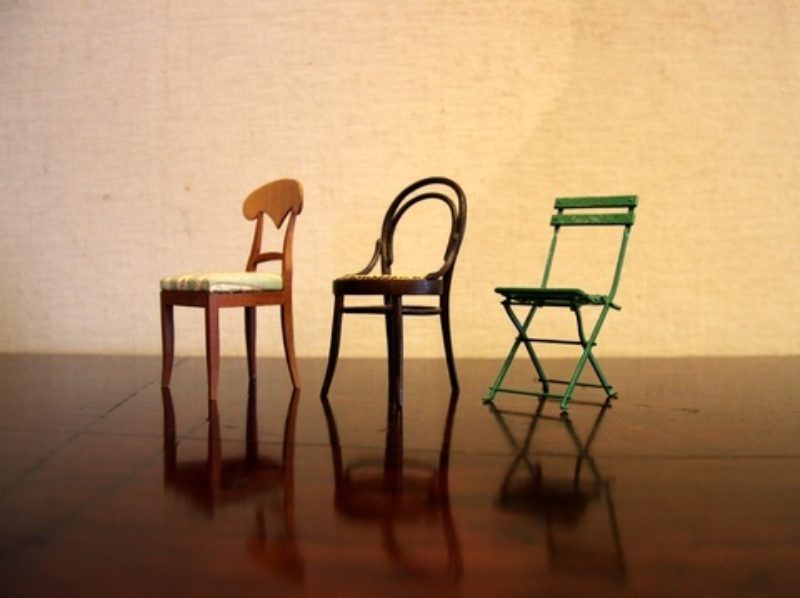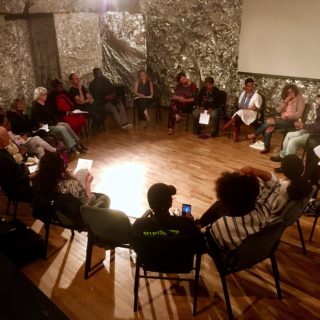Sing a song full of the faith that the dark past has taught us,
Sing a song full of the hope that the present has brought us,
Facing the rising sun of our new day begun
Let us march on till victory is won.
— Lift Every Voice and Sing (The Black National Anthem) [1]
Good morning heartache,
You old gloomy sight.
Good morning heartache.
Thought we said goodbye last night.
I turned and tossed until it seemed you had gone,
But here you are with the dawn.
— Good Morning Heartache [2]
It's morning. She can tell because the pale blue light of just-past-dawn has seeped into the corner of her room reserved for sleeping. She is up despite her desire not to be. There is a heavy ache in her skull. Why was she up so late last night? Oh right, job hunting. She has been job hunting for over a year. It's not that she hasn't gotten offers. She just hasn’t found one she can stomach. As the purple post-it on her bedroom wall reminds her: "I am tired of working for well-meaning liberal white folks who act like they are doing me a favor by sticking me in segregated spaces. 10 years is way more than enough."
“Well, guess what,” she grumbles at the post-it, “Job hunting for over a year is more than enough. Being broke sucks.”
She can afford to be picky. Sort of. Her mother had graciously offered to let her share her apartment for the low low contribution of only $400 a month while she got her shit together. It had been a calculated gamble. She’d taken a part-time non-profit job, so she could have 20 hours a week free to focus on building her art career. It had seemed like the quickest road to becoming a full-time self-employed black artist.
For a while, it had looked like that gamble/investment was paying off. Until she realized she couldn't handle the career boost she'd worked so hard to get. She just wanted the money and the resources. She didn't want the art world culture—not even the social justice non-profit art world culture. It wasn't until she was face-to-face with a person who could single-handedly finance a whole year's worth of her precious pro-black art projects, but wouldn't do it because it “didn't quite line up with their vision" that she realized she was wasting her time. Actually, it took one, two, three, four... four meetings with well-meaning liberal white people and a few disturbing after-work conversations with well-meaning liberal brown ones for her to realize she was fighting a losing battle. We're talking about the art world after all—an industry that paid Andres Serrano $250,000 to photograph a sculpture of Christ in a vat of urine and Chris Ofili $4,600,000 to make Madonna paintings out of elephant dung. $10,000 here and there for a few pro-black art projects seemed like an easy win. Until it wasn’t.
Non-profit work had been equally disappointing in its own way. So had academia. Colleges and universities were where artists went to get a stable paycheck when the freelance hustle got to be too much. But the culture had a way of seeping in so deep that you could never fully shake it off no matter how you tried. She, for instance, used to write in straightforward clear simple English. Toni Morrison and Nikki Giovanni were her heroes. Four years of stretching sentences to meet her college professors’ 10 page minimum requirements beat that out of her. She couldn't even think in simple sentences by the time they were done with her. Even her post-it affirmations were loaded with compound sentences. She had gone to school to learn to be of service to the people who had raised her. But after college, when she spoke, her tongue built walls instead of bridges. It wasn’t something she was proud of.
In her senior year of high school, she had come across this statistic: Black men who get a college degree make more money on average than those who don't. But black men who don't go to college have higher self-esteem.
She hadn't known what to do with this info.
She should have followed her gut.
Instead, she went to college and learned the hard way that that statistic was equally true for black women—at least the self-esteem part. She is still learning it. Still trying to rewire her instincts back to what she imagines they might have been if she had chosen the other route.
The morning train ride in to work is her last breath of fresh air before she enters the office. Then she closes her lips, shuts her eyes, and sticks her full self in her pocket. There will be no singing here. No jovial laughter. No scent of curry, collard greens, or okra. No Harlem shaking in her step. No renaissance continued. It dead ends here. Here she waits for something that will never happen. Counts down to desegregation that will never come. Nods her head in meetings about staff diversity and drifts away to daydreams of her real life. Her real life is the opposite of this. In it, her colleagues look at her and know that she is smart. Know she is an asset to be used and not a problem to be solved—a peculiar foreigner they will never fully understand. She remembers the day she realized her job was never going to hire any other black people. It's a curious thing to realize an organization that prides itself on making the world a better place has internalized its own racism so deeply that it can't see how to weed it out. Whiteness is like that.
Good morning Whiteness,
You old gloomy sight.
Good morning heartache.
Thought we said goodbye last night.
I tossed and turned until it seemed you had gone,
But here
You are
With the dawn.
Stop haunting me now.
Can't shake you no how.
Just leave me alone.
I've got those Monday blues
Straight through Sunday blues…
It is Wednesday. She needs to walk faster. She can hear her mother's daily warning from her childhood whistling in her ears: “You don't have as much time as you think you have.” She had already missed the first call for writers. No $100 writing job for her. She was early for the next one. Quick to rearrange her schedule for a chance to earn rent money. Date night can wait. Friends can meet her at the bar tomorrow. Tonight, she is on her way to JACK to see an event called “Cyclone Musings: Blackness, Citizenship & Reparations in the Afro-Atlantic.”

The gig feels like it’ll be easy. She has already gone to one other event in JACK’s Reparations365 series. It was called “Community Conversation: What Would Reparations Look Like?”[3] One of the guest speakers, Natasha Marin, was a lighthearted black woman who had started a website for micro-reparations. Black folks posted needs. White folks replied with money or gifts. The most common gift was airline miles. She had taken notes. She could use a free flight to see friends now and then. The other speakers weren't as lighthearted or funny. It's important to be funny when talking about a dead-end subject. There were people in the conversation older than her mother and others young enough to be her children. The only thing they seemed to have in common was that they were all still talking. Debating. Theorizing. Trying to draw a line around a hypothetical situation that would probably never come. How do you calculate the value of a human life? Is there a number that makes Rekia Boyd’s brother feel better about the holidays they’ll never get to share? A dollar amount that makes Eric Garner’s mother cease to mourn the too-soon passing of her son? A settlement that makes a child forget its longing for its absent mother? She may not have lived through slavery, but she had seen enough to know you can't repay a people for certain kinds of wrongs. There is no dollar amount, no apology, no prison sentence, no Truth and Reconciliation Commission big enough, or strong enough to fix it.
Shrug.
If life was fair, regrets would roll back time and we could let our hindsight sculpt our future.
Life isn't fair.
Sometimes you get screwed over.
And sometimes, you luck out.
As she crosses the street toward JACK's now familiar space, it strikes her that tonight she is in luck. Because even though reparations will probably never come, this writing assignment is still putting money in her broke-ass pockets. So that is something.
The ticket line is short. As promised, her name is on the guest list. Inside, the theater’s trademark walls glisten like a sea of dusty mirrors. They are covered in crumpled tinfoil—just like the last time she was here. She recalls suddenly that she had felt hopeful last time. Why was that? Oh yes! One person at that Community Conversation event had shared an idea that seemed like a real solution–not just a band-aid. Much to her surprise, the idea had come from an unassuming looking white woman. It hadn’t been a specific number. Instead, it was this ritual: every year at tax time, this white woman would calculate her income. Then, she would subtract the average income for black Americans in the same demographic—same age, same education level, etc. And then, she would donate a set percentage of the difference to organizations doing work to bring the black folks' income up to match the white ones’. It was very specific. And practical. It didn’t require petitioning lawmakers or convincing die-hard racists to change their minds. Just individual people making a personal promise. No walls of hate to bulldoze through except the ones inside. It was doable. Very doable.
Most importantly, she’d liked that it required white people to track the numbers. To try to find the cause behind the gap and track the country's progress. To chug along, generation after generation, just like black folks until the problem actually dwindled down to zero. She'd made a point of seconding the woman’s suggestion, just in case people were tuning her out because she was white. But it hadn't seemed to stick. The conversation had drifted back to hypotheticals. People like to talk in hypotheticals. She'd said hi to the woman afterwards to make sure she didn't feel discouraged. She’d told her she thought it was a good family tradition to start. That she hoped the woman would make it a tradition in her family. That she hoped other white folks would make it a tradition in their families too.
As the lights dim, she settles into her seat and pulls out a pen. She flips through the program scanning it for quotes. She likes quotes. One of her favorites is “A mind once stretched by a new idea can never return to its original shape.” She wonders if the woman’s comments had stretched someone’s mind that night a few months ago. She wonders if something will reshape her own mind tonight.
The performance begins with singing, then shifts to talking and poetry. The part that strikes her most is the two black women onstage who have a love-hate relationship with academia. They have been to college and graduate school. It has traumatized them. They have taken time to heal. They are thinking about going back. The opportunities, they say, are worth it. To hold at bay the never ending daily grind of work, sleep, eat, pay bills, work, sleep, eat, pay bills. To carve out time to travel to other countries. Time to talk and build with their black counterparts in distant places. It is worth the agitation, the stooping low, the gnawing at their self-esteem.
She thinks the women onstage are traumatized by all that stooping and by no means is it worth it. She tries to find a non-confrontational way to say it. “How much does a plane ticket to Lagos cost?” she asks. “Compare that to a year of Ivy League education.” Do the math and you begin to wonder why you think you need these white folks here to help you. Help you by hurting you. These people who after 50 years of federally mandated school desegregation, still can’t solve the puzzle of how to find black folks to fill their schools proportionately. These people who re-segregate and smile. Bring us black coffee at their oh-so-barely-integrated lunch counter. Smiling because they spat in it at the sink. Joke's on us. We pay the bill. Proud now because we've made them take our money. How will these people teach us blackness? How will they validate our education? What can they do for you except to suck the water from your leaves and drain the life blood from your roots? Claim your accomplishments as theirs and start the vicious cycle over. Trim one more generation of black intellects into now bonsaied trees.
As black mothers are quick to tell their children, we don't have as much time as we think we have.
They know how much gets wasted.
They count the hours.
The days.
The years.
They know all too well, life isn't fair
and no one's coming to help us.
They know it’s up to us find the answers.
It strikes her while listening to the people onstage that, more than anything, reparations could be time together. Time for black folks to be together—from all our scattered corners of the slave trade route. Time to learn each other. Time to pass on to each other all the seeds that we've been growing. To be more when we are together than we can be when we are apart.
It also strikes her that she cannot picture what this looks like. She has never seen it before. Never. It strikes her, that this is what slavery has done. That this is what racism continues to do. It robs the interest out from your investment every time it starts to grow. Eats your would-be redwood sprouts for dinner. Then fakes condolences by telling you that they were never going to grow much taller anyways.
Stoop knee-high now please.
The subject of the conversation at JACK wanders back to songs and readings, questions, and more questions. It's hard to draw a line around a hypothetical. The evening's host remarks the event is running past its allotted time, but that it is important to take time, make time, because the subject is important.
She agrees with the host.
She wants to stay longer, but it is late and she has work tomorrow. She is out of time.

She waits for a point in the conversation when all eyes turn away from her, then slips her pen into her pocket, and steps out silently into the autumn night. The trees outside are bare and frail. Their fallen, once-green leaves litter the sidewalk. She shuffles through, careful not to crush them. Above the soft whisper of shifting leaves, she hears the telltale sound of screeching brakes that signals the arrival of buses. Three buses pull up at the corner half a block ahead. She squints to see their numbers. One of them is hers. She sprints towards it, leaves crunching now beneath her feet, bag clutched tight so that her papers will not fall. The bus driver is patient. He waits for her. She thanks him with a nod, too out of breath to utter “Thank you.” He waves as if he understands.
She finds a seat where she can write and pulls the evening’s program out. On the ride home, she scribbles notes onto it so she can remember what to cover in her article. Quote number one: "I give myself reparations because nobody else is going to give it to us. We have to give it to ourselves.” Quote number two: "To live in America is to live in the shadow of whiteness. Privacy is a form of freedom.” And this quote from the poet who was speaking as she left: "That is the paradox of being black: I will always belong where I do not belong."
In other words, it is our duty as black people to insert ourselves in whiteness. To be the spots of ink in the milk that turn it gray.
She likes the last quote. Runs her finger over it as if this will commit the words to memory. “We owe the ones who came before us,” she mumbles audibly.
But inside she is tired of fighting.
She just wants to grow.
She puts away the evening's program and pulls out her binder of job application letters. There is one at the top that is her favorite. It has two brown women bosses. When she went in for the interview, the office smelled of redwood trees.
She fingers it and hopes.
[1] Written by James Weldon Johnson in 1900.
[2] First recorded by Billie Holiday in 1946; written by Irene Higginbotham, Ervin Drake, Dan Fisher.
[3] This event took place on March 20, 2017 and featured guests Adaku Utah (Harriet's Apothecary), Naima Penniman (Wildseed Collective) and Natasha Marin (www.reparations.me).



